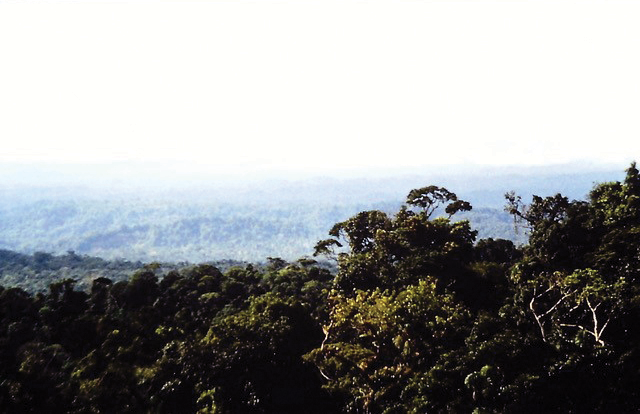
Primary rain forest on the eastern foothills of the Andes, Villano Project, Ecuador (Chapter 5).
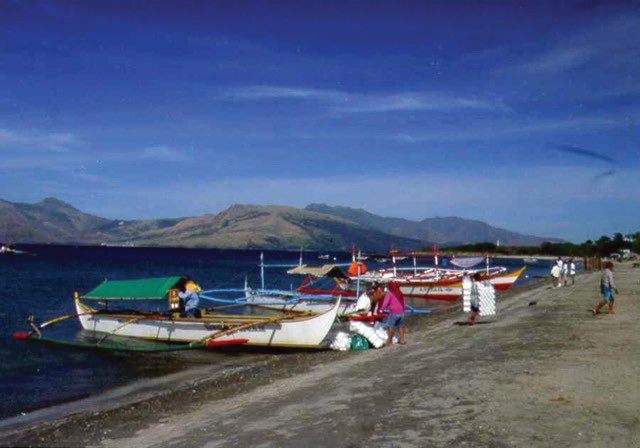
Bancas being outfitted for marine dcience investigations, Subic Bay, Philippines (Chapter 9).
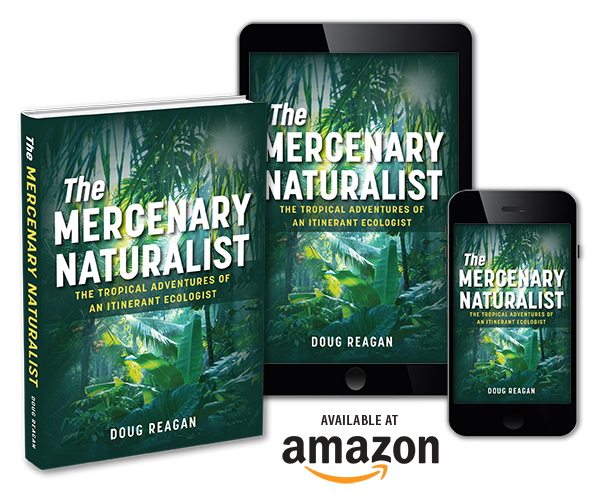
A full moon floats over the still surface of Lac de Guiers, Senegal. It’s late, and I’ve been walking the shoreline for hours in the company of a local villager. Every few minutes, we turn on our flashlights, searching for the red eye shine of crocodiles…. This is, I think, as close as I will ever come to fulfilling my wildest adventure fantasy, but I’m wrong. It’s only the beginning.
Doug Reagan’s entertaining memoir chronicles his exploits as an ecologist-for-hire on projects ranging from oil exploration in the Amazon to protected area planning in the Philippines. With humility and humor, Doug recounts his experiences with engineers, conservationists, indigenous peoples, government bureaucrats, and even baboons. Real-life situations provide unique insights into the complexities of finding workable solutions to environmental problems.
Whether capturing a venomous snake with an improvised tool or navigating jungles at night, Doug’s adventures bring these exotic places and people to life. The Mercenary Naturalist illuminates the ways in which we are interconnected and how what happens in faraway places has consequences for us all.
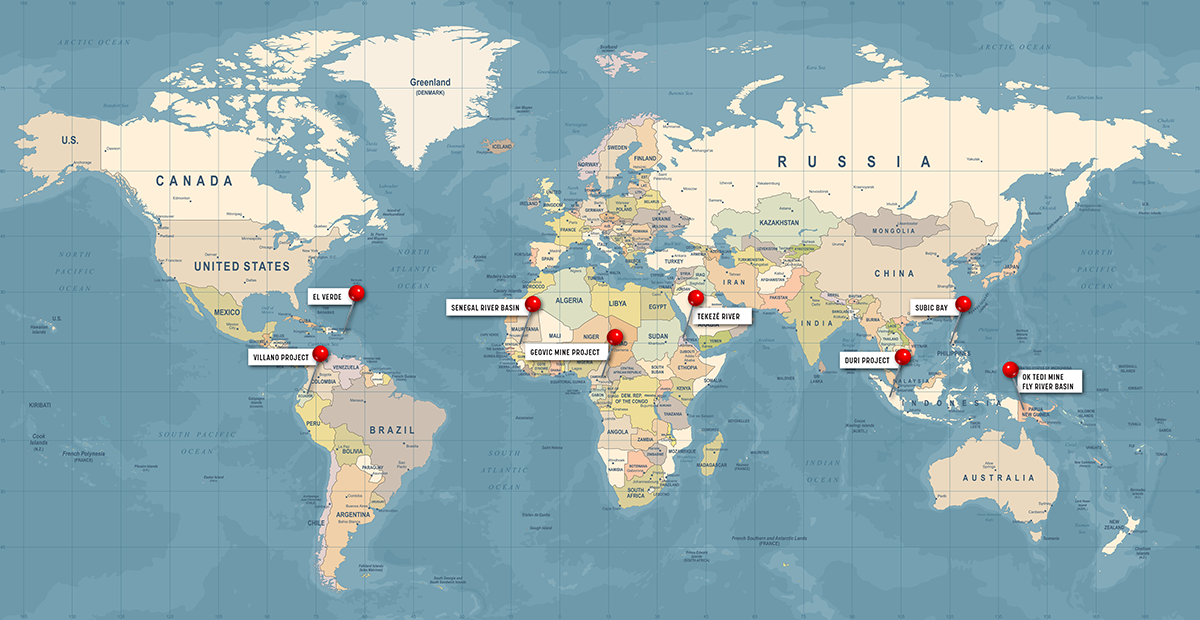

Primary rain forest on the eastern foothills of the Andes, Villano Project, Ecuador (Chapter 5).

Bancas being outfitted for marine dcience investigations, Subic Bay, Philippines (Chapter 9).
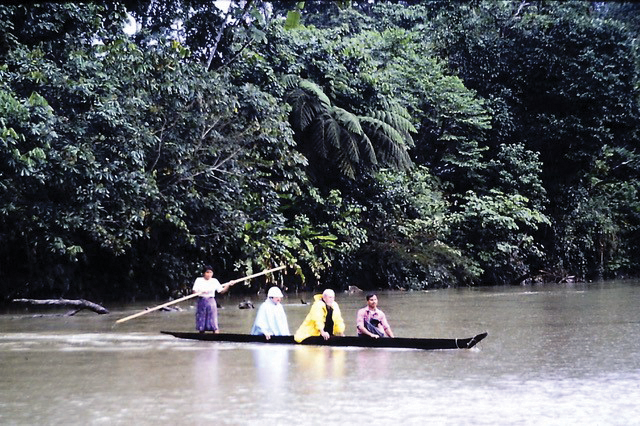
River crossing by dugout canoe, Villano Project, Ecuador, (Chapter 5).
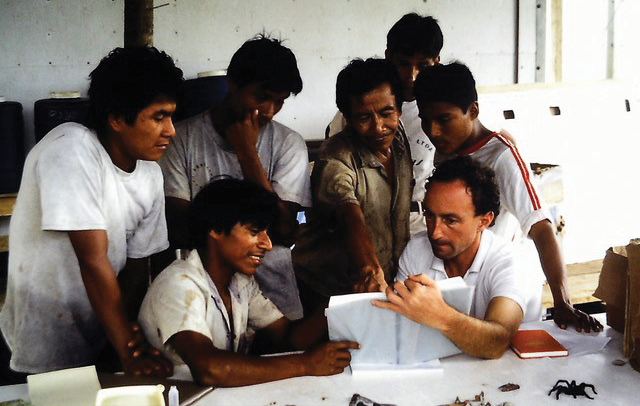
Quichua guide (Luis Garces) working with Ecuadorian wildlife biologist (Santiago Cobo) to identify wildlife species present at ARCO’s Villano Project site, Ecuador (Chapter 5).
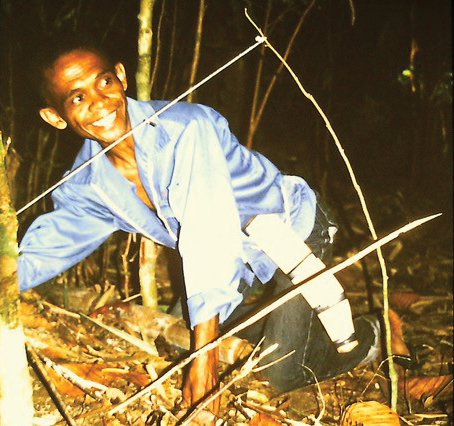
Aeta ranger (Susimo de la Cruz) demonstrating how to set a snare in the rain forest at Subic Bay, Philippines (Chapter 9).
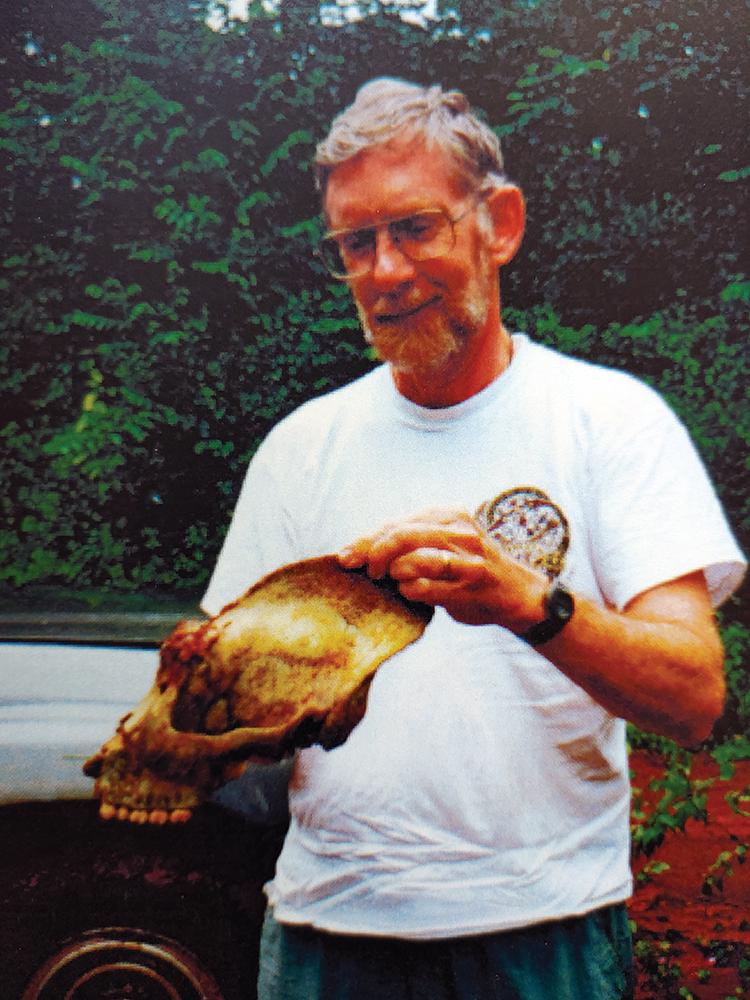
Author holding the skull of a lowland gorilla that was recently killed by poachers, Geovic Mine Project, Cameroon (Chapter 8).
A debut memoir focuses on a globe-trotting ecologist.
In this book, Reagan shares stories from his decades of working as an ecologist and consultant in a career that was both physically and metaphorically wide-ranging. The memoir opens in 1977 in Senegal, where the author made his first trip overseas to assess the environmental impacts of a major infrastructure project. He contended with unfamiliar languages and customs, dangerous animals, officious bureaucrats, and budget-conscious project managers while putting his skills to use and doing work that had a significant effect on the lives and livelihoods of thousands of people. In subsequent chapters, Reagan recounts traveling to various locations, including Puerto Rico, Ecuador, Eritrea, the Philippines, and Indonesia, working in academia and industry to understand how the different environments functioned, how plants and animals were affected by development, and how ecological needs could be balanced against economic realities to benefit as many organisms as possible. The author takes note of the technological and cultural shifts he observed over the decades of his career and demonstrates his own professional development. When he recalls being unexpectedly placed in charge of an entire project—instead of his usual environmental assessments—the book shifts to a more big-picture narrative, following Reagan’s efforts to unite a heterogeneous group of stakeholders whose interests were often at odds with one another. In the volume’s final chapter, the author revisits each project, doing his best to find out what happened in the decades since his work was completed and assessing the successes and failures.
Reagan is a strong storyteller with a wealth of material to draw from, and he does an excellent job of bringing his adventures to the page. While there is plenty of science in the book, it is always presented in a way that is accessible to nonspecialist readers and blends in among the author’s tales of taking down a venomous snake with improvised equipment, learning to fuse his scientific data with the expertise of his local assistants, successfully communicating despite limited language skills, and narrowly avoiding close encounters with large beasts. The prose is generally straightforward and down-to-earth, but when Reagan allows himself an occasional flight of descriptive fancy (“A profusion of colors dazzles the eyes, ranging from the bright fruits in markets to the flamboyant plumage of cordon bleu finches and red bishop weaver birds around muddy puddles in dirt streets”), the result is delightfully vivid. The author is a keen observer of the unfamiliar environments he found himself in, and despite some questionable adjectives (such as the “woolly” or “kinky” hair of some of the people he meets), he deftly dramatizes his far-flung experiences without exoticizing them. Although Reagan is telling his own story, he is generous to colleagues, and readers are never left imagining that he set off into the wilderness by himself or made unaided scientific discoveries. The memoir also takes a thoughtful approach to the intersection of economic development and environmental protection, offering appreciations to companies that acted responsibly and suggestions for future collaborations.
An engrossing look at an intriguing career in ecology.
“The Mercenary Naturalist” is an absolute gem that will teleport you to alien worlds, some of which no longer exist. From the streets of 1970’s Senegal to remote villages so far off the beaten path that only the most determined would even think of venturing there, the author’s first-hand recounting of the sights, sounds, smells, and people are so wonderfully expressive that you feel you are experiencing them for yourself. Based upon the journals of a professional ecologist and ardent observer of his surroundings, these ten stories are a beautiful but bittersweet whirlwind tour through worlds that, for better or worse, are quickly disappearing. An absolute joy to read that leaves you wanting more. —Paul Hanke
If you are interested in ecology and how it affects us all you need to read this book. Very exciting also for a non-fiction book. —Jay Treat
I thoroughly enjoyed reading “The Mercenary Naturalist.” The author’s retelling of his work collecting ecological data for various purposes in often remote and dangerous regions of the world, over a period of decades, is fascinating. His tales of encounters with dangerous animals and humans are captivating; yet his interactions with the indigenous peoples are most interesting and enlightening. His efforts to engage them, to understand their customs and role within his study areas, is commendable. He even consumes local “cuisine” and joins festivities to garner trust. We see Dr. Reagan’s ecological investigations evolve over the decades and the book ends with his very thoughtful assessment of the world’s ecosystem, especially the rain forests. —Fred Applehans
This book is a memoir of my experiences as an ecologist working in tropical landscapes around the globe. Though much of my career was spent in developed countries and in the Arctic, it was while working and living in tropical regions that I encountered some of the most urgent environmental and social issues presently confronting the Earth and its inhabitants. In remote tropical locations, I gained fresh insights from indigenous peoples and was able to implement unconventional strategies to effect positive change. That’s what this book is about, and that is why its scope is limited to the tropics.
Each chapter is a narrative about a particular natural ecosystem and the people whose lives and culture are embedded in it. Thus, it is also about human dignity and human tragedies, savagery and compassion, resilience and hope. It is neither a feel-good piece of nature writing nor an anti-environmentalist diatribe. It is intended to be an entertaining and readable mixture of natural science, anthropology, travel, and personal growth. But first, a little background.
In my youth, I collected snakes, turtles, frogs, and salamanders; set up my first balanced aquarium; and devoured books about wildlife and wild places. In college, my love of nature guided me into courses on botany, zoology, geology, and other natural sciences. I majored in biology in graduate school and became an ecologist—a scientifically trained naturalist.
A few years after receiving my PhD, I ran into one of my former professors at a biology conference. We hadn’t seen each other since my graduation, and he asked me what I was doing now. When I told him I was working as an ecologist at an environmental services firm in Pittsburgh, his response was immediate.
“So you went for the money, eh!”
My jaw dropped, then closed. I turned my back on him and walked away. We never spoke again. My impulsive response now seems unduly harsh, but I was not prepared for this snap judgment of my motives by my former mentor and colleague. It hurt. Deeply.
Our meeting came at a time of growing awareness of human impacts on air, water, forests, and wildlife that, in turn, spawned laws requiring environmental protection. In response, a new profession—applied ecology—had quickly arisen. I saw this as a positive development, but many of my associates, including my former professor, viewed this development with suspicion. They understood the role of biologists in academia and in government agencies tasked with managing natural resources, but they feared that environmental practitioners hired as consultants by industries and governments would abandon scientific ethics and become primarily concerned with making money—that they would become mercenaries.
I, however, was thrilled that there was now a profession that provided me with opportunities to apply my ecological training to the preservation and restoration of healthy ecosystems. I saw my role as no more mercenary than that of medical doctors applying science to maintain human health and heal the sick. Louis Pasteur understood this when he said that there are no such things as applied sciences, only applications of science.
In a career spanning four decades, I have been variously tasked with assessing ecological impacts of river basin development projects in East and West Africa, evaluating the effects of oil and gas development on biodiversity in the Amazon, leading an ecological assessment of the expansion of the Panama Canal, performing ecological assessments of mining in Papua New Guinea and in the Congo River Basin, and developing mitigation projects for impacts of natural resource development around the world. The culmination of my overseas work was managing a multinational team to develop a plan to establish a protected area—a first step to creating a new national park—at Subic Bay, Philippines.
Because most projects required working closely with people of other cultures in remote circumstances, I operated well outside of the “travel bubble” created for casual visitors on packaged tours. I treasured opportunities to meet and work with indigenous people, living and laboring with them to assess and protect the ecosystems on which their lives depended. They taught me to see the world from the perspective of humans embedded in, and largely dependent on, their local environment. Some called themselves “the real people” and that is how I came to view them. I was often humbled by what I learned from illiterate (but not ignorant) people with whom I had the privilege of working. Though I only glimpsed their world, we routinely formed bonds of friendship and mutual respect that transcended language and myriad other cultural differences.
Events described in these chapters were often humorous, mostly enjoyable, and invariably enlightening. In the course of my work, I faced poisonous snakes in Africa and the Philippines, spent a night hunting for crocodiles with a poacher in West Africa, evaded the charge of an irate elephant in East Africa, interviewed pygmy hunters in the Congo Basin about the vanishing wildlife in their forest, wandered through the Amazon rain forest with Quichua and Machiguenga guides while assessing human impacts on rain forest biodiversity, and more.
Edward Abbey once wrote that in writing, fidelity to facts leads eventually to the poetry of truth. I agree. A faithful recounting of actual events best illustrates the ambiguity of situations and issues generally portrayed by the media as distorted (and frequently biased) oversimplifications of complex reality. I have therefore endeavored to minimize preachy pontifications and to present a variety of perspectives, based on my personal experience with events taking place in far-flung locations. Acknowledging the possibility of memory drift, I’ve relied heavily on the field journal that I have kept for more than half a century.
My primary motivation for writing this book was to provide context for transformations now taking place in the natural world. I did this from the unique perspective of someone who has worked mostly for corporations and governments, and with individuals ranging from career bureaucrats to elders of indigenous societies. I wanted to share what I learned because there is an urgent need to understand these changes, their causes, and the many intentional and unintended consequences of human developments in natural ecosystems. Several decades of personal experience have shown me that politicians, corporations, and the mainstream news media have done a generally poor job of addressing that need.
A secondary motivation was to encourage academic and research scientists to devote increased efforts to environmental problem-solving. The planet is in crisis; the need is urgent. Perhaps more than any other profession, those of us who call ourselves ecologists have a moral responsibility to apply what we know to sustain the structure, function, and other essential characteristics of the natural systems on which all life depends.
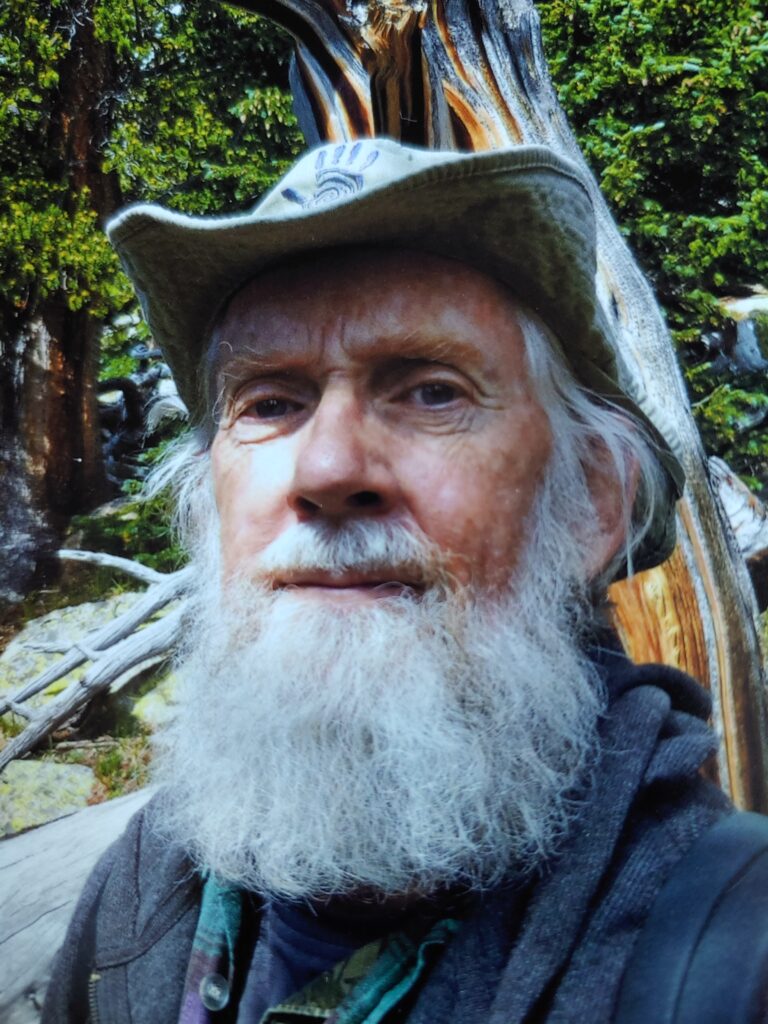
Doug Reagan has served as a consultant and advisor to US and foreign governments, a contractor to various industries, a research scientist executing projects in environments ranging from the Arctic tundra to tropical rain forests, and an adjunct on the graduate faculty of the University of Colorado at Denver, where he taught a graduate-level course in applied ecology.
After receiving his PhD in Zoology, Doug found his calling as an applied ecologist and spent the next four decades working to understand, protect, and restore the natural harmonies of ecosystems around the world. In the course of these endeavors, he met and worked with many members of cultures still embedded in (and dependent upon) naturally functioning ecosystems. His experiences working with indigenous peoples in diverse environments and similar work with individuals from modern societies closer to home provided him with a broad range of unique insights into the current relationships of humans to other species and to the land, water, and air that support all life.
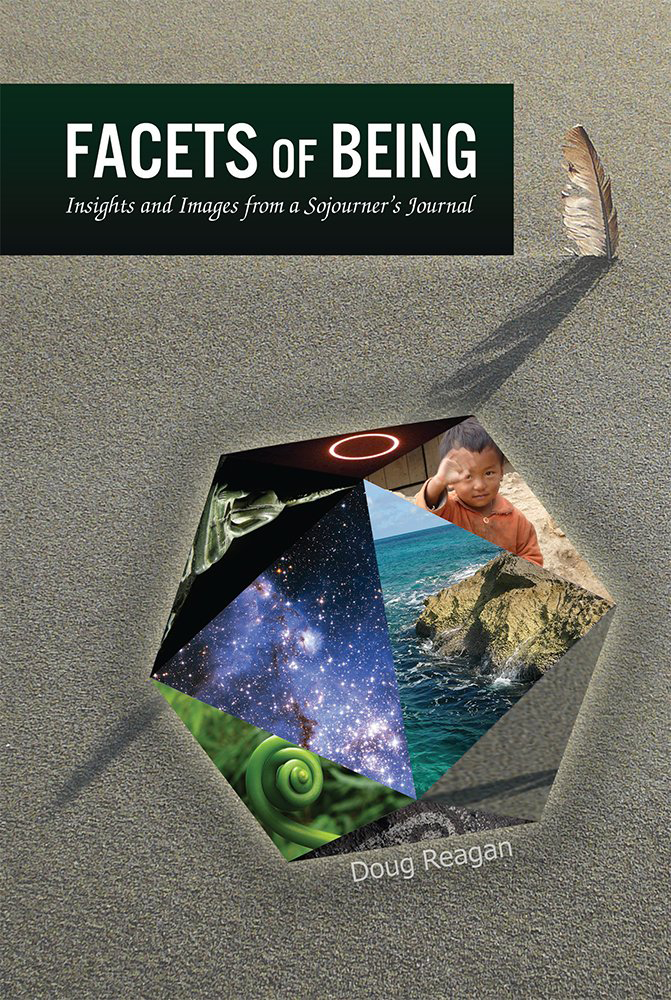
Much of my working life was spent sojourning in remote areas of a dozen countries on six continents and adjacent islands. Many of the people I encountered were from cultures living at the fringes of modern society – the Aeta in the Philippines, Baka Pygmies in Cameroon, lowland Quichua in Ecuador, various Native American tribes, and others. Their intelligence and dignity humbled me and taught me to see with fresh eyes. Like the facets of a gemstone, some of these writings reflect their surroundings while others provide windows for introspection. Each composition expresses an image or insight produced by some unique combination of place, time, people, and, of course, age, during a lifetime of adventures.
For questions or comments, please message Doug and he will reply within two business days.